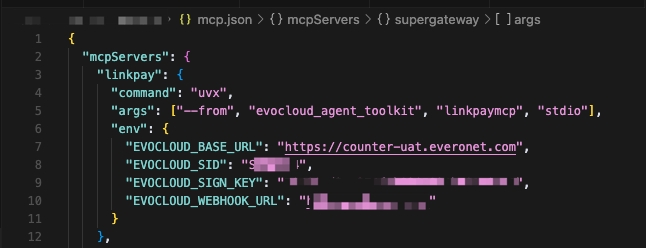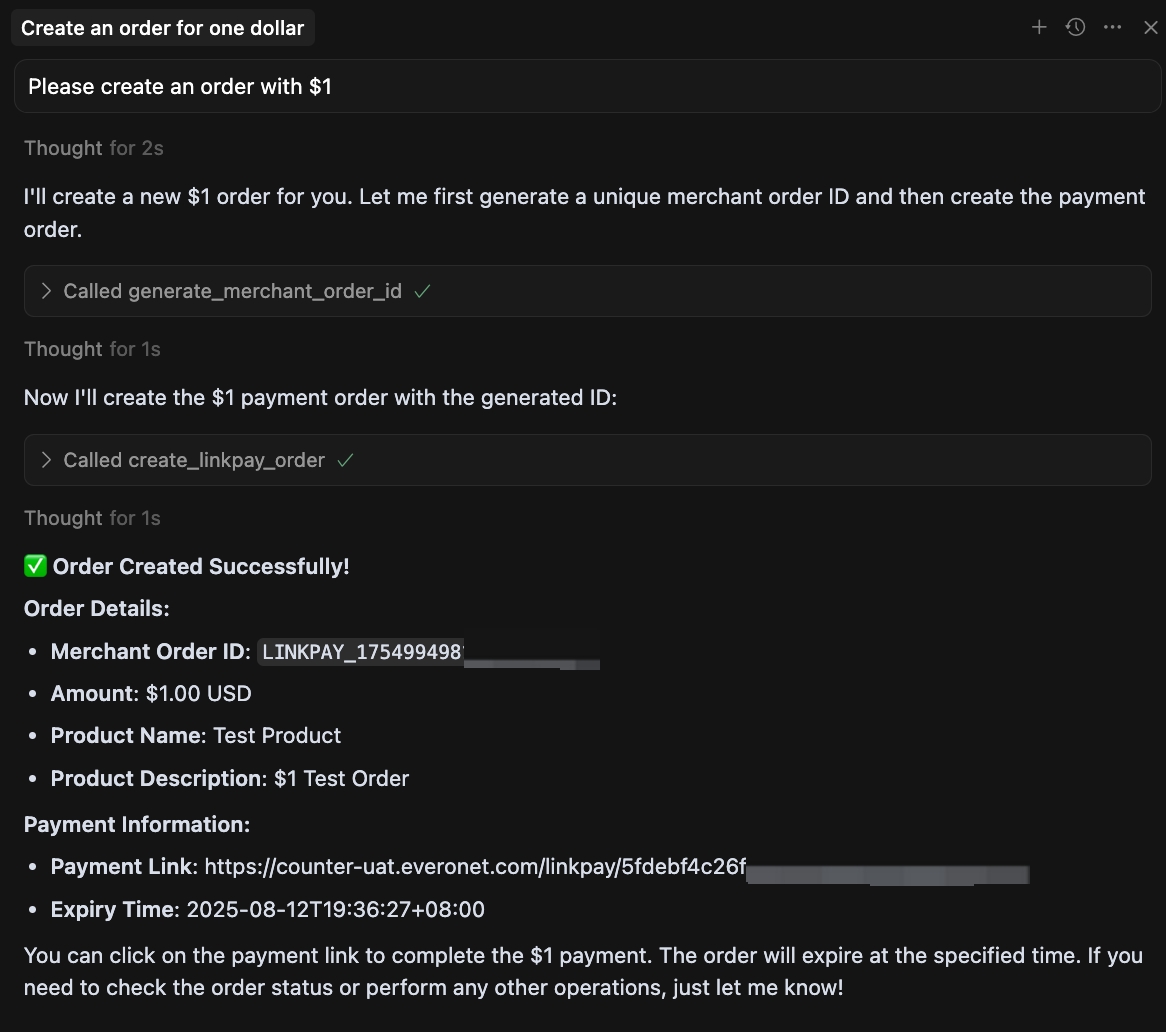MCP Server Preview
The EVO Payment MCP server defines a set of tools that AI agents can use to interact with the EVO Payment API.
Explore this SDK to integrate EVO Payment into agentic workflows. Because agent behavior is non-deterministic, use the SDK in a sandbox and run evaluations to assess your application’s performance.
Prerequisites
MCP Client
- Ensure you have a functional MCP client. For detailed client list, please refer to https://modelcontextprotocol.io/clients
- Ensure you have installed uv, please refer to the documentation https://docs.astral.sh/uv/getting-started/installation/
Environment Variables
Before using LinkPay MCP, you need to configure the following environment variables:
| Environment Variable | Description | Required |
|---|---|---|
EVOCLOUD_BASE_URL | EvoCloud API base URL (defaults to UAT service) | Yes |
EVOCLOUD_SID | EvoCloud merchant ID | Yes |
EVOCLOUD_SIGN_KEY | EvoCloud signature key | Yes |
EVOCLOUD_WEBHOOK_URL | Payment callback URL | No |
MCP Server Configuration
Add the following configuration to your MCP client configuration file:
json
{
"mcpServers": {
"linkpay": {
"command": "uvx",
"args": ["--from", "evocloud_agent_toolkit", "linkpaymcp", "stdio"],
"env": {
"EVOCLOUD_BASE_URL": "https://counter-uat.everonet.com",
"EVOCLOUD_SID": "Your merchant ID",
"EVOCLOUD_SIGN_KEY": "Your signature key",
"EVOCLOUD_WEBHOOK_URL": "https://example.com/webhook"
}
}
}
}Feature Overview
LinkPay MCP provides the following core features:
1. Generate Merchant Order ID
- Function name:
generate_merchant_order_id - Description: Generate a unique merchant order ID
- Parameters:
prefix(optional): Order ID prefix, defaults to "LINKPAY"
2. Create Payment Order
- Function name:
create_linkpay_order - Description: Create a LinkPay payment order
- Parameters:
merchant_order_id(required): Merchant order IDcurrency(required): Currency code, e.g., "USD", "CNY"amount(required): Payment amountmerchant_order_time(optional): Order timegoods_name(optional): Product namegoods_description(optional): Product descriptiontrade_type(optional): Transaction typereturn_url(optional): Return URL after payment completionwebhook_url(optional): Payment status callback URLenabled_payment_methods(optional): List of supported payment methodsvalid_time(optional): Order validity time (minutes)
3. Query Order Status
- Function name:
query_linkpay_order - Description: Query LinkPay order status
- Parameters:
merchant_order_id(required): Merchant order ID
4. Create Refund
- Function name:
create_linkpay_refund - Description: Create a LinkPay refund request
- Parameters:
original_merchant_order_id(required): Original order IDmerchant_trans_id(required): Refund transaction IDcurrency(required): Currency coderefund_amount(required): Refund amountmerchant_trans_time(optional): Refund timereason(optional): Refund reasondescription(optional): Refund description
5. Query Refund Status
- Function name:
query_linkpay_refund - Description: Query LinkPay refund status
- Parameters:
merchant_trans_id(required): Refund transaction ID
Usage Examples
1. Configure LinkPay MCP service in Cursor
Configure the service as follows:

Save the configuration and check if the LinkPay service is running normally in the MCP tools list

2. Create LinkPay transaction order

Security Considerations
- Key Security: Ensure sensitive information like
EVOCLOUD_SIGN_KEYis stored securely, do not hardcode in the source code - HTTPS: Production environment must use HTTPS protocol
- Signature Verification: Callback webhooks should verify the validity of request signatures
- Order Idempotency: Ensure the same
merchant_order_iddoes not create duplicate orders - Amount Validation: Validate the reasonableness of amounts before processing payments

